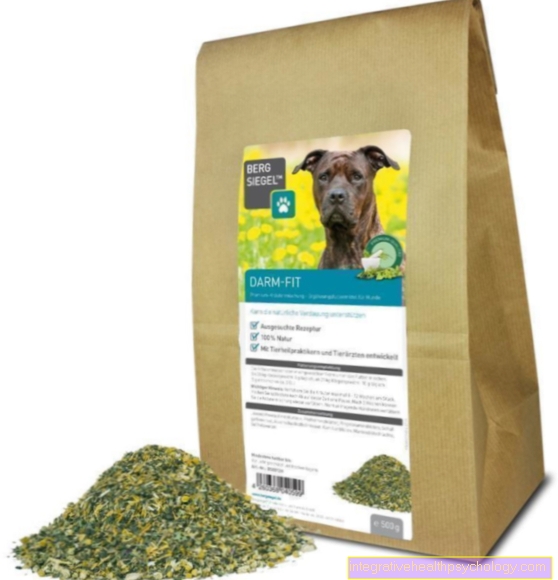Sore throat in pregnancy
introduction
The term sore throat in pregnancy usually refers to pain that comes from the throat. This is mostly pain caused by infection and inflammation of the mucous membranes. However, sore throats can also come from other areas of the throat.Infections often cause swelling of the cervical lymph nodes, which can be noticeable as tenderness.

causes
Sore throats during pregnancy can have various causes. In most cases, it is a harmless cold due to a viral infection that does not require further treatment. However, bacteria can also trigger the sore throat. Often the tonsils are also inflamed in this case, which can lead to a more severe course of the disease.
Allergies or chemical pollutants such as smoke and dust can cause the lining of the throat to become inflamed, causing a sore throat. There are some pathogens that cause sore throats and make the disease process very straightforward for most people. In pregnant women, however, drug therapy, for example with antibiotics, is more difficult to carry out, as many drugs can harm the unborn child.
Particular attention should be paid to infections such as toxoplasmosis or listeriosis. These pathogens can be transmitted from mother to child and cause serious damage.
Toxoplasmosis
Toxoplasmosis is a normally harmless infectious disease that is transmitted by cats. Anyone who has ever had an infection forms antibodies and can usually no longer be infected later. Toxoplasmosis is usually accompanied by mild symptoms such as fever, fatigue, headaches and aches and pains. Often a sore throat occurs as part of swollen lymph nodes in the neck.
Toxoplasmosis is only dangerous during pregnancy. During this time, the infection can spread to the unborn child and cause severe damage there, some of which can lead to the death of the child.
More on this: Toxoplasmosis
Listeriosis
Listeriosis is an infectious disease that can be transmitted through contaminated food. In normally healthy people, the disease usually causes flu-like symptoms.
Pregnant women have an increased risk of illness up to twelve percent. With them, too, symptoms such as fever and sore throat are often dismissed as simple flu. The disease becomes dangerous for the unborn child. The placenta (placenta) may become inflamed, which will transfer the bacteria to the child. This leads to blood poisoning, meninges and pneumonia in the children. In the worst case, the child dies.
More about this: Prohibited foods during pregnancy
Concomitant symptoms
difficulties swallowing
In many cases, a sore throat is accompanied by difficulty swallowing. The mucous membranes are irritated by the inflammation in the throat. When swallowing, mechanical pressure acts on the mucous membrane of the throat, which quickly leads to pain in the presence of inflammation and irritation. Despite the difficulty swallowing with a sore throat, it is recommended to drink a lot. Sage tea or a hot lemon in particular can inhibit inflammation, calm the mucous membrane and thus reduce pain.
fever
A sore throat with an additional fever most likely indicates a simple cold or a flu-like infection. Since an infection during pregnancy can also affect the unborn child, a doctor should be consulted if a fever occurs. This can initiate targeted diagnostics with the help of which he can assess the severity of the infection. Depending on the outcome of the diagnosis, therapy with simple home remedies or, if necessary, medication may be necessary.
therapy
The treatment of many diseases is a challenge, especially during pregnancy. Many drugs are not approved for use by pregnant women because the drug is known to damage the unborn child or it is not known whether the child could be harmed. Since studies on pregnant women are prohibited in Germany, the drugs cannot be tested.
As a rule, sore throats can be traced back to relatively harmless colds, even during pregnancy. These are treated symptomatically with a large amount of drinking, tea and cough drops. If the sore throat is caused by a bacterial disease, antibiotics may be necessary. However, this must be discussed in detail with a responsible doctor, as only a few antibiotics are approved for pregnant women. Therefore, therapy with home remedies is usually recommended for a sore throat. Under close supervision, however, medication may have to be used if the symptoms worsen. The decision in each individual case depends on how at risk mother and child are from the disease and how dangerous the drug required for therapy is.
Medication
There are many drugs available for sore throats. Most of them are available over the counter at pharmacies and are generally harmless. However, many of these drugs are not approved for pregnant women. The reason for this is that drug studies are not allowed in pregnant women and therefore no objective data on drug administration during pregnancy can be collected. It is therefore not possible to make a general statement about which medication will help with a sore throat during pregnancy. Since sore throats that occur in isolation are initially harmless, they should be treated with unproblematic home remedies such as lozenges, various teas and different solutions for gargling. However, especially if additional symptoms such as fever occur, a doctor should be consulted. After a detailed diagnosis, the doctor can prescribe specific medication that is also safe during pregnancy. If you still want to have over-the-counter drugs from the pharmacy for a sore throat, you should inform the pharmacist about your pregnancy.
Dolo Dobendan
Dolo Dobendan ® is a sore throat medication, the effect of which is based on two different active ingredients: benzocaine and cetylpyridinium chloride. Benzocaine is a pain reliever and when taken as a lozenge is primarily effective for sore throats. The benzocaine numbs the nerve fibers that conduct pain, creating the analgesic effect. Cetylpyridinium chloride is an antiseptic and is said to work against the bacteria that cause the sore throat. In general, the Dolo Dobendan lozenges are suitable for children from 6 years of age. However, there is insufficient research on Dolo Dobendan during pregnancy and breastfeeding. It is therefore only advisable to take it after a doctor's recommendation.
Other drugs with similar effects: Lemocin®, Neo-Angin®, Dorithricin®
Home remedies
Taking medication is often problematic, especially during pregnancy, so if you have a slight sore throat, you should first resort to some tried and tested home remedies. To keep the mucous membranes moist you should drink a lot. Lozenges, which stimulate saliva production, are also available in pharmacies. Another home remedy is, for example, the hot lemon. Ideally, add a teaspoon of honey. The sour lemon stimulates the production of saliva and causes the mucous membranes to remain moist. Gargling with sage tea or salt water is also recommended as it has a disinfectant effect on the mucous membranes.
also read: Gargle with salt water- This is how it's done
ginger
Ginger can be consumed in tea or as a spice in food. The ginger unfolds its full effect on sore throats. Due to the mixture of pungent substances and essential oils, ginger can work particularly well on mucous membranes and respiratory tract. On the one hand, ginger kills bacteria; on the other hand, it dissolves the mucus and improves blood circulation in the mucous membranes. The better blood circulation helps the body to develop its own defenses.
sage
Sage has a calming effect on the mucous membranes. Thanks to its ingredients, it also works against bacteria and relieves pain. If you have a sore throat during pregnancy, you can ingest sage in different forms: Many throat candies contain sage. The candies stimulate the production of saliva and thus keep the mucous membranes moist. The same moisturizing effect is obtained by gargling with sage tea. The sage tea can of course also be drunk. The increased amount of water you drink additionally moisturizes the mucous membranes, and a good balance of fluids is also important in order to adequately supply the body at elevated temperatures.
homeopathy
The use of homeopathic remedies during pregnancy can be dangerous for the unborn child, depending on the active ingredient. Therefore, they should only be taken during pregnancy after careful consultation with a doctor. There are many different homeopathic active ingredients against sore throats, the use of which varies depending on the type of sore throat. Belladonna is effective for sore throats with difficulty swallowing. Aconitum is particularly suitable for flu or an infection. Phytolacca and Apis mellifica are recommended for severely swollen and reddened almonds.
You might also be interested in this topic: Homeopathy for colds
Duration
The duration of a sore throat during pregnancy depends to a large extent on what is causing the disease. While a mild cold usually passes within a few days to a week, a flu-like infection can last significantly longer. Depending on the severity of the infection, drug therapy may be necessary. Various home remedies can be used to shorten the duration of the sore throat even without medication. Teas with sage or ginger are particularly suitable. Sage and ginger soothe the mucous membranes and have an anti-inflammatory effect. Drinking a lot also helps against the sore throat.
diagnosis
The diagnosis “sore throat during pregnancy” arises purely from the clinical symptoms. Often colds and infections are the cause. Further diagnostic work-up is required to assess the severity of the sore throat. For this it is relevant whether the throat is reddened and whether the tonsils are swollen. For a potential therapy it is important to distinguish a viral from a bacterial infection. This is usually decided on the basis of various blood values.
You might also be interested in this topic: Colds during pregnancy
Can a sore throat be a sign of pregnancy?
A sore throat is usually not a sign of pregnancy. At the beginning of a pregnancy, the absence of a menstrual period is usually noticeable. You may experience abdominal pain and, especially in the morning, nausea and vomiting. Sore throat may occur as part of vomiting, as stomach acid travels through the esophagus and into the throat. Because of the high acid content, irritation of the mucous membrane can occur. However, this is usually only the case if vomiting is very frequent. Therefore, a sore throat is a rather atypical sign of pregnancy.
This topic might interest you: Signs of pregnancy





























